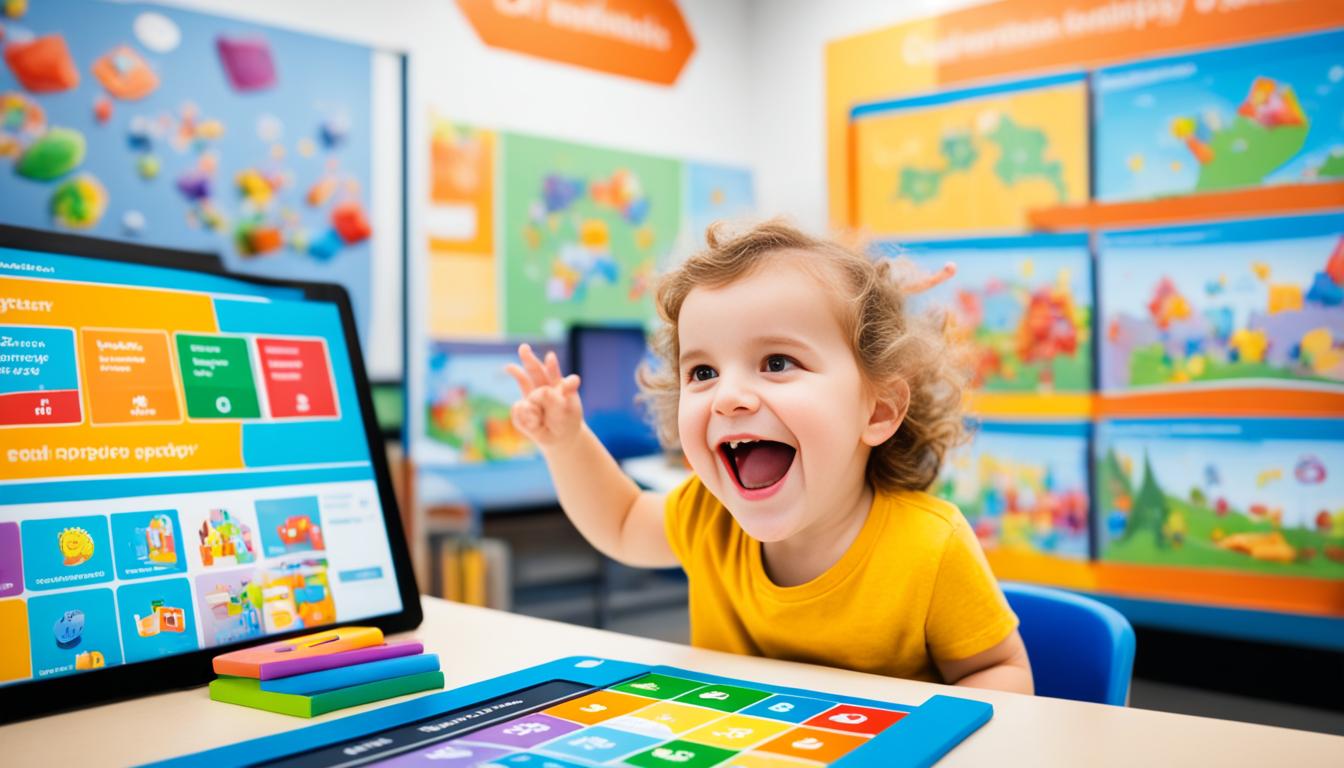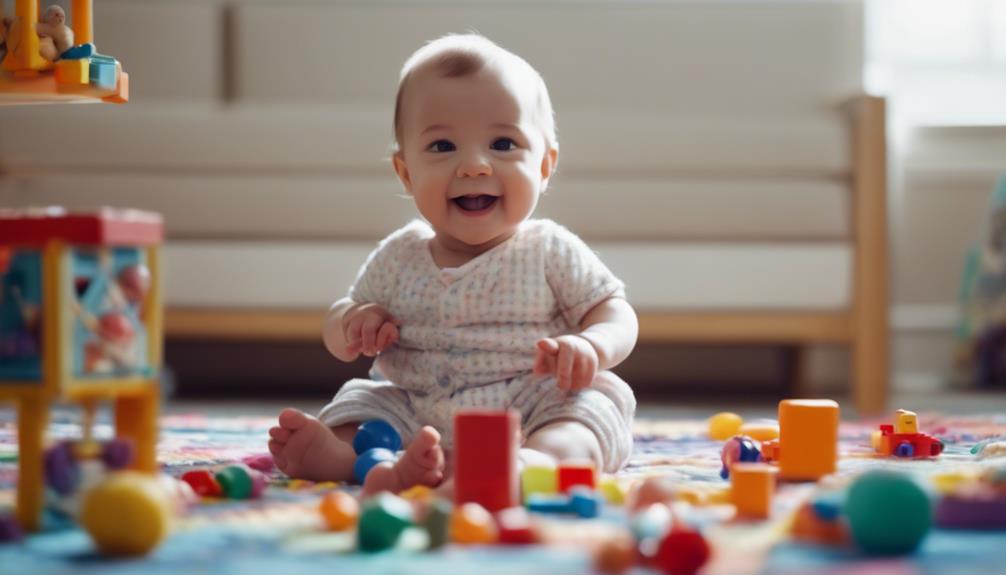Most babies start saying their first words between 9 and 14 months, though each child develops at their own pace. You may notice early signs like babbling, gestures, or imitating sounds before actual words emerge. Factors like hearing, environment, and social interactions influence this milestone. Celebrating chaque small step can boost confidence. If you’d like to know more about what to expect or how to support your baby’s language growth, there’s plenty more to explore.
Key Takeaways
- Most babies say their first words between 9 and 14 months, but individual timing varies.
- Early vocalizations like babbling and gestures typically start around 4 to 6 months.
- Response to name and imitating sounds are signs of emerging speech skills.
- Delayed first words beyond 15 months may warrant evaluation or speech support.
- Consistent, interactive communication and a nurturing environment promote early speech development.
Typical Age Range for First Words

At what age do babies usually start saying their first words? Most babies begin to say their first words between 9 and 14 months, marking a key stage in language acquisition. During this period, they reach important speech development milestones, such as understanding simple words and connecting sounds to meanings. Every baby is unique, so some may start earlier or later, and that’s perfectly normal. By around their first year, many infants can say simple words like “mama” or “dada,” and their vocabulary gradually expands. Recognizing these milestones helps you understand their progress. Keep in mind, consistent exposure to language through talking and reading promotes healthy speech development and ensures your baby hits these important milestones comfortably. Additionally, trendy dog sweaters are popular among pet owners for festive gatherings, which can be a fun way to celebrate milestones with your family and pets. Providing a rich language environment and engaging in frequent conversations can support your baby’s speech development, and engaging in positive reinforcement techniques can encourage your baby to practice new words and build their confidence in speaking. Moreover, understanding the stages of early language development can help you tailor your interactions to better support your child’s growth. Incorporating interactive play also fosters communication skills as babies learn to express themselves through different activities.
Early Signs of Language Development
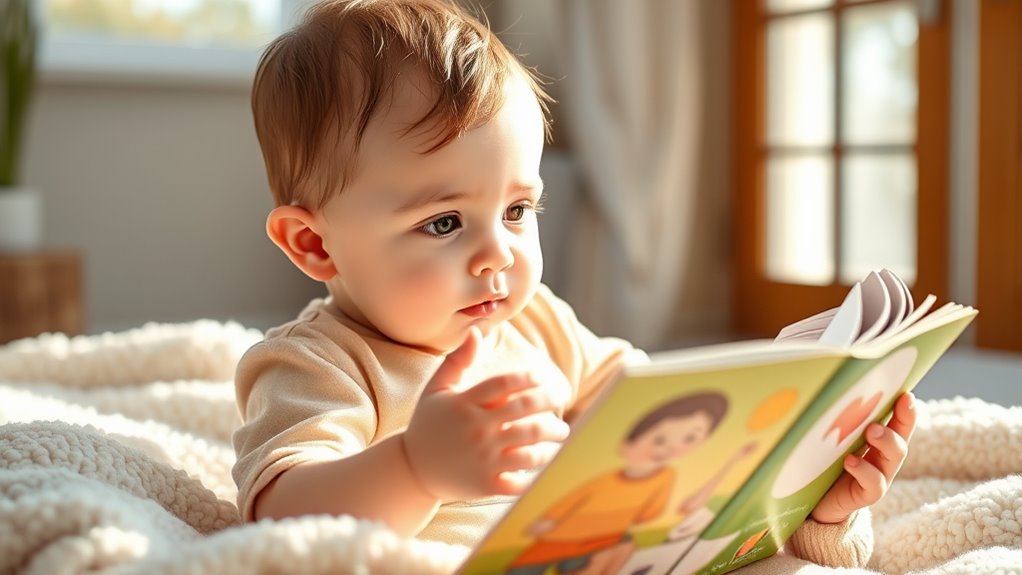
Recognizing early signs of language development can help you gauge your baby’s progress before they start speaking their first words. Around 4 to 6 months, your baby might begin to respond to their name, babble, or imitate sounds. They may also show interest in conversations, turn their head toward voices, or use gestures like pointing. These behaviors indicate that their auditory and social skills are developing, which are foundations for speech. In addition, engaging in talking and reading to your baby can promote language development and encourage early communication skills. Incorporating sensory stimulation activities can further support their understanding of sounds and words. Paying attention to these signs helps you support your baby’s communication growth and ensures they’re on track for their first words. Understanding typical milestones can also help identify developmental delays, enabling timely support and guidance. Monitoring their emotional responses and reactions can also provide insights into their auric energy and overall emotional well-being, further supporting their growth. Being attentive to their early vocalizations can help you recognize their progress in sound production and help foster a nurturing environment for language acquisition.
Factors That Influence Speech Milestones
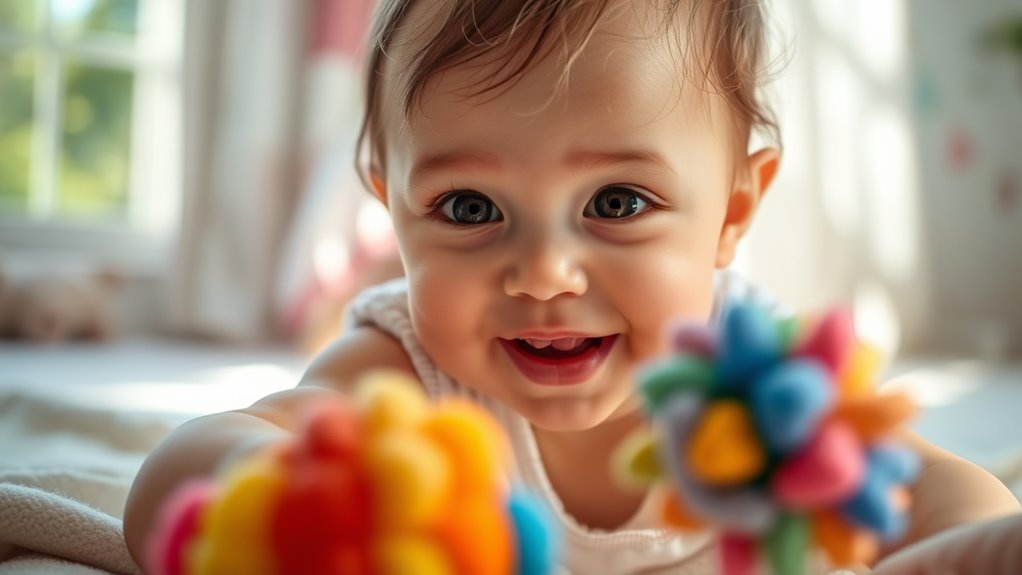
Your baby’s hearing and listening skills play a vital role in reaching speech milestones. Good auditory development ensures they can recognize sounds and respond appropriately. Social interactions and the environment they grow up in also considerably impact their language development. Creating a supportive environment that encourages positive communication can positively influence their overall development. Additionally, creating a supportive environment that encourages alternative investments can positively influence their overall development. Supporting early exposure to language through tuning and interaction further boosts their ability to develop speech skills effectively. Recognizing the importance of angel numbers and spiritual guidance can also foster emotional well-being, which indirectly supports language development. Some researchers suggest that dreams with prophetic significance may reflect subconscious processing related to personal growth and understanding, which can influence emotional stability beneficial for language acquisition.
Hearing and Listening Skills
How do hearing and listening skills influence a child’s speech development? They are vital because they enable your child to recognize sounds, imitate speech, and understand language meaning. When hearing is impaired, it can delay speech milestones. To support your child’s progress, consider these key points:
- Regular hearing checks guarantee your child’s hearing is functioning properly, preventing undetected issues.
- Early intervention with speech therapy can help children with hearing difficulties catch up in their language development.
- A thorough language assessment helps identify specific needs, guiding targeted strategies to foster speech growth.
- The quality of your child’s home audio environment can also significantly impact their listening skills and overall speech development.
- Creating a sound-rich environment at home encourages active listening and language acquisition, which can be supported by proper air quality to reduce allergens and pollutants that may affect hearing health.
- Proper listening skills are essential for effective communication and language learning, emphasizing the importance of fostering attentive listening from an early age. Additionally, understanding dream symbols related to communication can offer insights into your child’s emotional development and help address any underlying anxieties about speaking.
Social and Environmental Factors
Social and environmental factors play a crucial role in shaping a child’s speech milestones by providing the opportunities and interactions necessary for language development. Neighborhood interactions expose your baby to a variety of sounds, words, and social cues, encouraging them to imitate and learn. Regular conversations with family members and peers help build their vocabulary and understanding of communication. On the other hand, environmental noise can influence how well your baby focuses on speech and sounds. Excessive background noise may make it harder for them to distinguish words, potentially delaying speech milestones. Creating a balanced environment with meaningful social interactions and manageable noise levels supports your child’s language growth and fosters early communication skills essential for their development. Additionally, AI-powered smart devices can offer interactive learning experiences that stimulate language development in young children.
How to Support Your Baby’s Language Skills
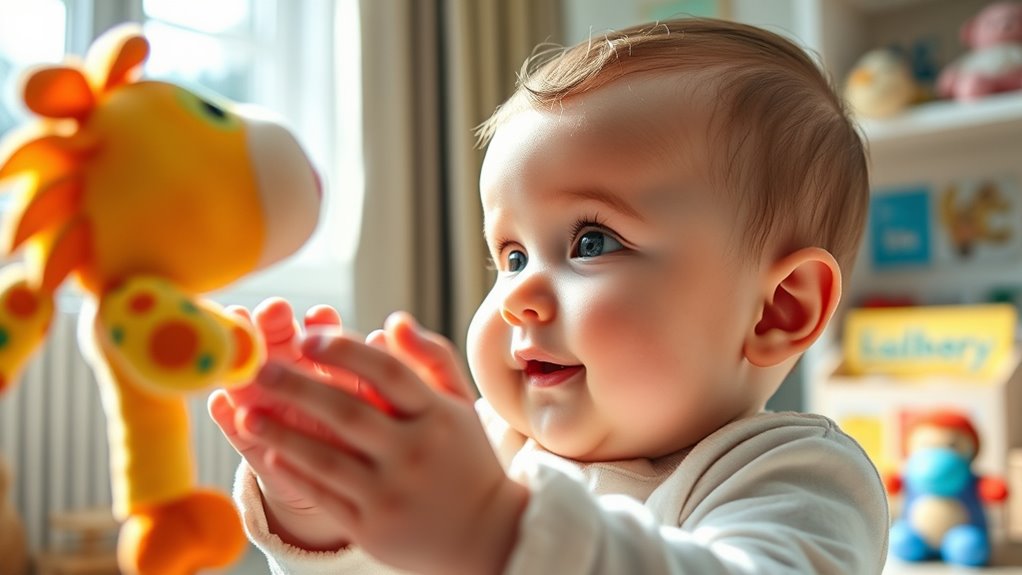
To support your baby’s language skills, make sure to talk regularly and clearly, using simple words and a warm tone. Engaging in interactive play also helps your baby learn sounds and gestures naturally. These practices encourage your little one to communicate confidently as they grow. Incorporating imagination into everyday interactions can further stimulate your baby’s cognitive development and language acquisition.
Talk Regularly and Clearly
Have you ever noticed how babies seem to eagerly listen and respond when you speak to them? Talking regularly and clearly helps build their language skills. Here’s how you can support their development:
- Speak slowly and pronounce words clearly to enhance their understanding.
- Use simple sentences to make vocabulary expansion easier.
- Incorporate speech therapy techniques when necessary, especially if you notice delays.
Consistent, clear communication encourages your baby to imitate sounds and words, fostering confidence. It also strengthens your bond and creates a language-rich environment. Remember, your voice is their first and most important language model. By speaking clearly and frequently, you help set a strong foundation for their speech development and future communication skills.
Encourage Interactive Play
Engaging your baby in interactive play is a powerful way to support their language development. Use activities like singing songs, which can incorporate music therapy techniques to stimulate their listening and vocal skills. Incorporate language apps designed for babies, offering playful ways to introduce new words and sounds. During play, point out objects, imitate sounds, and ask simple questions to encourage your baby to respond. Playing with musical toys or reading interactive books also fosters communication. Remember, your active participation creates a rich language environment, helping your baby associate words with actions and objects. Consistent, engaging play not only entertains but also lays a strong foundation for their future language skills.
The Role of Interaction and Play
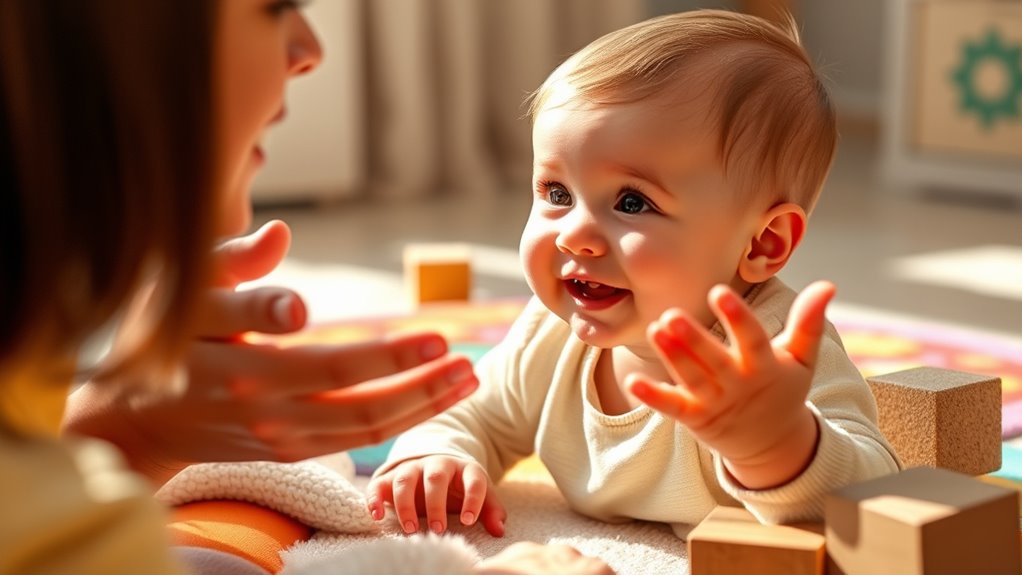
Ever wondered how interaction and play shape a baby’s development? They are essential for building communication skills. Engaging with your baby helps them grasp gesture understanding, which is necessary for early conversations. During play, you’ll notice their babbling patterns become more complex, signaling progress in language skills. Here’s how interaction boosts development:
- It encourages your baby to imitate sounds and gestures, laying the foundation for words.
- Playtime strengthens emotional bonds, making them more enthusiastic to communicate.
- Responsive interactions help your baby understand that their sounds and gestures have meaning.
Recognizing Different Types of Early Words
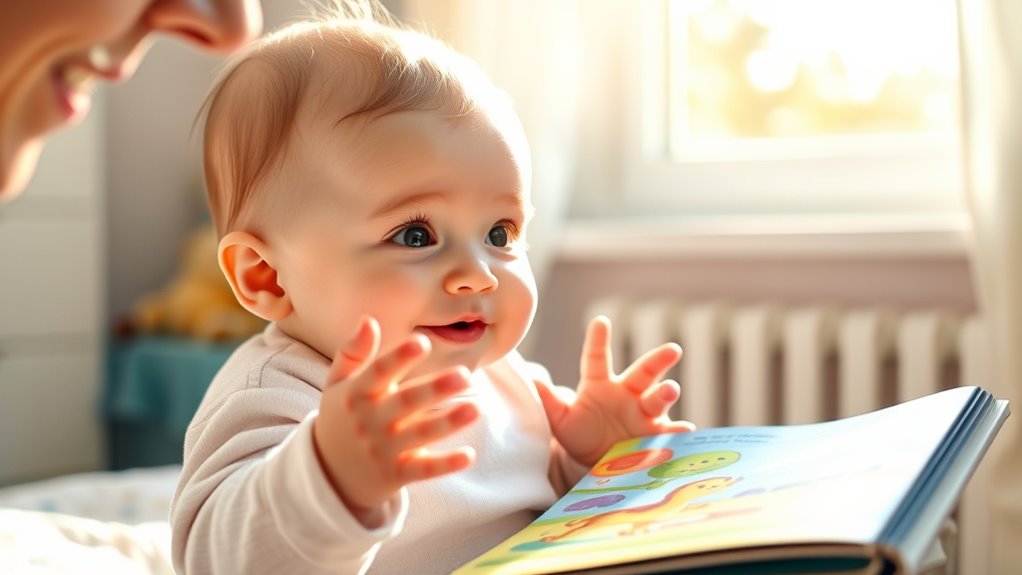
Recognizing different types of early words helps you understand your baby’s developing language skills. Early words vary widely, including sounds, gestures, and simple words. Some babies begin with sounds like “ba” or “ma,” while others use gestures like waving or pointing. Bilingual development can influence early vocabulary, with babies sometimes mixing words from both languages. Music therapy can also support language growth, encouraging sound recognition and pronunciation. Here’s a quick guide:
| Type of Early Word | Description | Examples |
|---|---|---|
| Expressive words | Words that convey needs or feelings | “Mama,” “bye-bye” |
| Receptive words | Words your baby understands but doesn’t say yet | “Come here,” “No” |
| Gestures | Non-verbal communication | Pointing, waving |
| Sounds | Babbling or phonetic sounds | “Ba,” “Da” |
Recognizing these helps you support their language journey effectively.
When to Be Concerned About Speech Development
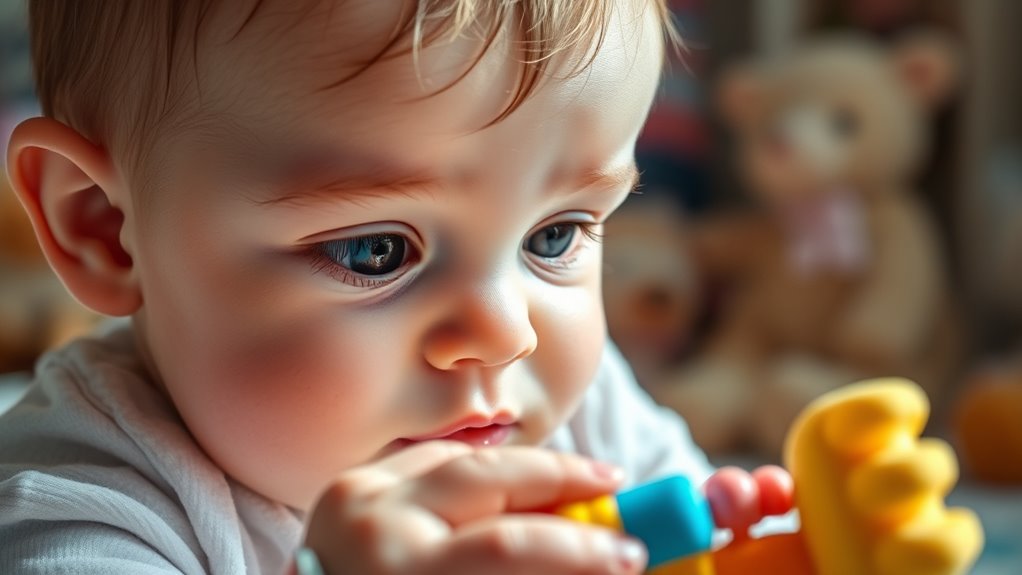
You should start to worry if your child isn’t reaching key speech milestones by certain ages, like saying their first words by 12 months. Watch for signs like limited vocabulary or difficulty imitating sounds, which could indicate a delay. If you notice these signs, it’s important to seek guidance from a healthcare professional promptly.
Typical Speech Milestones
Understanding typical speech milestones helps you identify when your child’s development is on track or if there might be cause for concern. By around 12 months, many babies say their first words, marking a key point in language acquisition. Usually, by 18 months, toddlers combine words into simple phrases, showing progress. Around age 2, most children speak in sentences and expand their vocabulary.
If your child:
- Struggles to say simple words by age 2,
- Has limited sounds or vocabulary after 18 months,
- Shows no interest in communication,
it’s time to contemplate speech therapy. Recognizing these milestones helps you know when to seek support, ensuring your child’s language development stays on track.
Recognizing Delay Signs
How can you tell if your child’s speech development isn’t progressing as expected? Watch for signs like limited babbling beyond age 12 months or a lack of gestures such as pointing or waving. If your child isn’t making eye contact or responding to their name by 12 months, it could signal a delay. Early recognition is key; consider scheduling a language assessment to evaluate their communication skills. Professionals may recommend speech therapy if delays are identified, helping your child develop proper speech and language abilities. Keep in mind that some variation is normal, but persistent delays warrant concern. Trust your instincts and consult a specialist if you notice these signs, ensuring your child receives the support they need for healthy communication development.
When to Seek Help
Noticing signs of speech delay can be concerning, but knowing when to seek help makes a difference. If your child isn’t babbling by 12 months, isn’t using simple words by 18 months, or shows little interest in communication, it’s time to act. Early intervention is key, and speech therapy can support your child’s development. Consider scheduling developmental assessments if these signs persist, as they can identify underlying issues. Ignoring delays may affect social skills and confidence later on. Trust your instincts—consult your pediatrician or a specialist if you’re worried. The earlier you seek help, the better your child’s chances of overcoming challenges and thriving. Remember, professional guidance can make a meaningful difference in your child’s language journey.
The Importance of Reading and Storytelling
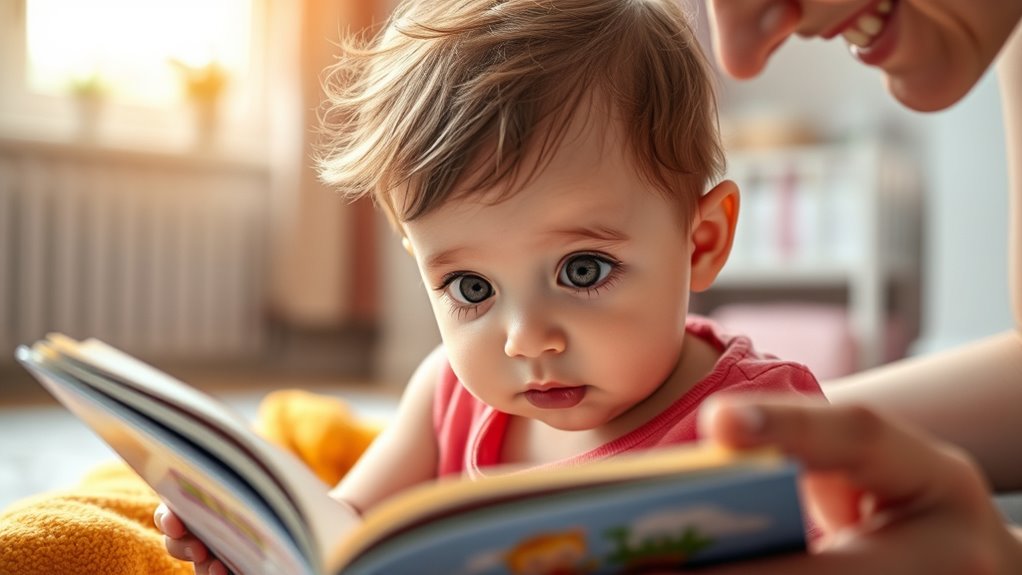
Reading and storytelling play an essential role in a baby’s development by nurturing language skills, sparking imagination, and building emotional connections. The benefits of storytelling extend beyond vocabulary; they teach babies about emotions, routines, and the world around them. When choosing age-appropriate books, you help guarantee your little one stays engaged and understands what they see and hear. Bright pictures, simple words, and familiar themes are perfect for early reading. Regular storytelling sessions foster a love of books and strengthen your bond. By making reading a daily habit, you create a positive environment that encourages your baby to explore language naturally. Remember, engaging your baby with stories now sets a strong foundation for their future communication skills.
Differences in Speech Development Among Babies
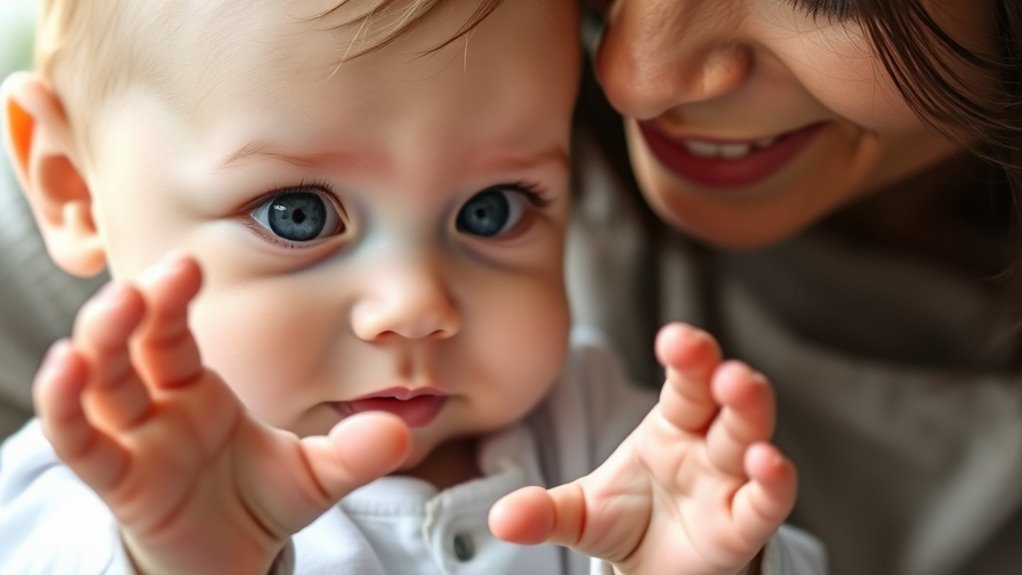
While every baby benefits from stories and language-rich environments, their speech development can vary widely. Some babies may start with gestural communication, like pointing or waving, before saying their first words. Others, especially bilingual children, might develop two language systems simultaneously, leading to different timelines for speech milestones. You might notice:
Every child’s speech development varies, shaped by gestures, bilingualism, and individual growth trajectories.
- Variations in the age when your baby begins babbling or producing words.
- Differences in how quickly they combine sounds or phrases.
- Unique patterns shaped by bilingual language development, possibly with mixed words or delayed speech.
These differences are normal and reflect each baby’s individual growth. Embrace the diversity in their progress, and remember that early milestones are just one part of their unique language journey.
Celebrating Your Baby’s First Words

Celebrating your baby’s first words marks an exciting milestone that highlights their growing ability to communicate. When your baby says their first word, it’s a moment to cherish and encourage. You might notice their gestures, like pointing or waving, which are part of gestural communication that complements spoken words. Celebrate their progress by responding enthusiastically to their attempts, whether it’s a simple word or an expressive gesture. Pay attention to their babbling patterns, which often serve as practice for real speech. These sounds show their developing vocal skills and readiness to connect verbally. By acknowledging these early efforts, you support their confidence and language growth. Every new word is a step closer to meaningful communication, so savor each achievement along the way.
Frequently Asked Questions
How Can I Tell if My Baby Is Hearing Properly?
You can tell if your baby hears properly by paying attention to their responses. Notice if they turn toward sounds or respond to their name—these are key speech milestones. Hearing assessments by a pediatrician or audiologist can provide reassurance. If your baby doesn’t react to sounds or shows delayed speech milestones, it’s important to seek professional advice to guarantee their hearing develops normally and support their language skills.
Do Twins Usually Speak Earlier or Later Than Single Babies?
Twins often develop language skills differently from single babies, but there’s no strict rule. Some twins may speak earlier due to twin language development, where they communicate with each other uniquely. Others might hit single baby milestones later because they focus on social interaction with their twin rather than individual speech. Keep in mind, every child’s timing varies, so it’s normal if your twins are early or late talkers.
Can Exposure to Multiple Languages Delay Speech Development?
You might worry that exposure to multiple languages in a multilingual environment could delay your baby’s speech milestones. However, research shows that bilingual or multilingual children often reach speech development milestones on a typical schedule. They may take a little longer to differentiate sounds or form words, but this is normal. Your baby is simply learning multiple languages, which can enhance cognitive skills and communication abilities in the long run.
What Are Some Common Speech Delays in Different Cultures?
You probably think every culture’s speech development is the same, but giant differences can cause delays. In some cultures, strict communication norms or unique language acquisition practices might slow down early speech. For example, if your child’s culture emphasizes non-verbal cues over words, they might start talking later than others. These cultural variations can influence when and how children develop speech, but patience and understanding will help support their progress.
How Can I Encourage My Shy or Reserved Baby to Speak?
To encourage shy babies and boost reserved speech, create a warm, supportive environment where they feel safe to express themselves. Use gentle conversations, eye contact, and smiles to build their confidence. Play interactive games and read aloud regularly, which helps them become more comfortable with talking. Avoid pressuring them, and praise small efforts. Over time, your consistent encouragement will help your shy or reserved baby open up more naturally.
Conclusion
Remember, your baby’s first words are like tiny seeds of communication, ready to bloom in their own time. While milestones vary, your encouragement and interaction nurture their language growth. Celebrate each small step, for they’re the stars guiding you through this beautiful journey. Trust in your baby’s unique rhythm—soon enough, their voice will fill your world with a melody all their own, turning silent moments into a symphony of connection.



